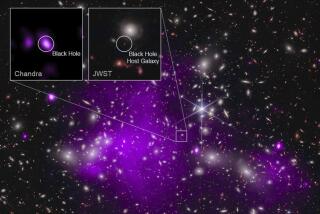Higgs boson: Web goes wild with speculation
The Internet is crackling with rumors following news reports that the long-sought Higgs boson -- popularly referred to as the “God particle” -- has been detected and that physicists at the Large Hadron Collider atom-smasher CERN, near Geneva, will announce the discovery in a news conference July 4.
Physicists have been speculating for months that the particle’s discovery would be the topic of CERN’s scheduled news conference Wednesday, but Britain’s Daily Mail and the Associated Press upped the ante Monday with articles declaring the announcement was a certainty.
“Scientists believe that the ‘God particle’ that might explain the underpinnings of the universe is real, and they are about to present their evidence to the world,” the AP declared Monday, in an article first titled “Proof of ‘God particle’ found” and later downgraded to “Evidence of ‘God particle’ found.”
The AP story quotes British theoretical physicist John Ellis, a CERN worker since the 1970s (who is not a member of either of the two experimental teams), as saying: “I agree that any reasonable outside observer would say, ‘It looks like a discovery….’ We’ve discovered something which is consistent with being a Higgs.”
“Scientists at the Large Hadron Collider are expected to say they are 99.99 percent certain it has been found -- which is known as ‘4 sigma’ level,” Britain’s Daily Mail said.
Physicists have been “quivering with anticipation” over detection of the Higgs, as my colleague Eryn Brown recounted in a December story titled “The jig may be up for Higgs boson.” The subatomic particle, first proposed to exist by physicist Peter Higgs of the University of Edinburgh nearly five decades ago, could answer a central question: Why is there mass in the universe?
Higgs and other theorists proposed that particles could get their mass “by traveling through a particular type of energy field,” Brown wrote. “It came to be known as the Higgs field; the process by which mass is created, the Higgs mechanism. There also had to be a particle associated with the field: the Higgs boson.”
The 17-mile-long Large Hadron Collider has been searching for the particle since 2010. Two rival teams -- known for short as CMS and ATLAS -- have been conducting the experiments. To be sure that they have detected the Higgs, teams must reach a level of certainty known as 5 sigma -- meaning there is less than a 1 in 1.7 million chance that they are wrong.
On Monday, U.S. researchers at now-retired Tevatron collider at Fermilab announced that they’d found hints of the Higgs boson and set a limit for what its mass could be.
Bloggers are having a field day with the rumors -- as they have for months. As Alexander Abad-Santos at AtlanticWire notes, “Today, we found out that there’s proof that the Higgs boson is out there. But you probably knew that if you were following the physics world’s best gossips who broke the news two weeks ago.”
Peter Woit, a senior lecturer in mathematics at Columbia and a physics PhD, is one of those top Higgs “gossips.” On June 17, Woit posted on his blog “Not Even Wrong” that he had heard CERN’s 2012 data -- in addition to its 2011 data -- indicated “strong hints of Higgs around 125 GeV” with “about a 4 sigma signal.” That’s less than the 5 sigma physicists want to see. (“GeV” stands for “gigaelectron volt.”)
”If 2011 was a fluke, you expect to see nothing much around 125 GeV in the 2012 data. If the 2011 signal really was the Higgs you expect to see the signal to strengthen,” Woit wrote back then. “What I’m hearing from both experiments is that they are seeing an excess in the new data, strengthening the significance of the signal.”
Woit speculates on his blog entry today that “neither CMS nor ATLAS have quite managed to reach the 5 sigma threshold, and CERN remains dedicated to not discussing the obvious result of combining the data.“
In the AP article, a CERN spokesman said that such data-combination was a “complex task,” and for that reason “no combination will be presented on Wednesday.”
Aidan Randle-Conde, a post-doc working on the ATLAS experiment, wrote last week on the blog Quantum Diaries that rushing to combine the data should neither experiment get 5 sigma would be “the worst thing we could do at the moment.... The Higgs field was postulated nearly 50 years ago, the LHC was proposed about 30 years ago, the experiments have been in design and development for about 20 years, and we’ve been taking data for about 18 months. Rushing to get a result a few weeks early is an act of impatience and frustration, and we should resist the temptation to get an answer now. Providing good, quality physics results is more important than getting an answer we want.”
“Better for CERN to just announce discovery and break open the champagne,” Woit rejoinders.
In a news report over at the journal Nature, Matthew Chalmers writes that “even as rumors fly in the popular media, physicists have begun quietly cheering at CERN, the European particle-physics lab near Geneva in Switzerland. ‘Without a doubt, we have a discovery,’ says one member of the team working on the ATLAS experiment, who wished to remain anonymous. ‘It is pure elation!’ ”
Chalmers quotes an unnamed physicist working on CMS who says that “in practice you would have to be monstrously skeptical not to be convinced by what we have now.” And he writes that CERN has confirmed that “four of the theorists who dreamt up the Higgs mechanism in the 1960s -- François Englert, Carl Hagen, Peter Higgs and Gerald Guralnik -- will be present at Wednesday’s seminar.” (It would be perhaps mean to drag them all that way and then announce, “Nothing yet, folks.”)
But what, exactly, have the physicists found? They will need to know more about the particle they have detected, Chalmers notes -- “if it behaves like a mass-giving Higgs and, more specifically, whether it behaves like the Higgs predicted” in the standard model of particle physics.
Will the results be interesting? Maybe not interesting enough, writes Adam Mann in a blog post at Wired titled “How the Discovery of the Higgs Boson Could Break Physics.”
“The possible announcement on July 4 of the long-sought Higgs boson would put the last critical piece of the Standard Model of Physics in place, a crowning achievement built on a half-century of work by thousands of scientists. A moment worthy of fireworks,” he writes.
And then he adds: “But there’s a problem: The Higgs boson is starting to look just a little too ordinary.”
In what might be considered a glass-half-empty viewpoint, a lot of scientists had been “secretly hoping” that the particle they found would be interesting and unexpected -– and if that’s not what they find, it “leaves less room for new, exciting physics,” and “if coming years fail to turn up interesting results, the field could be headed for a crisis,” Mann writes.
Scientists working on the data point out that none of the commenters in the blogs or mentioned by name in the news articles is involved in analyzing the data -- so just like everyone else, they could be speculating.
So far, officials actually working on the experiment have declined to discuss the speculation on the record.






